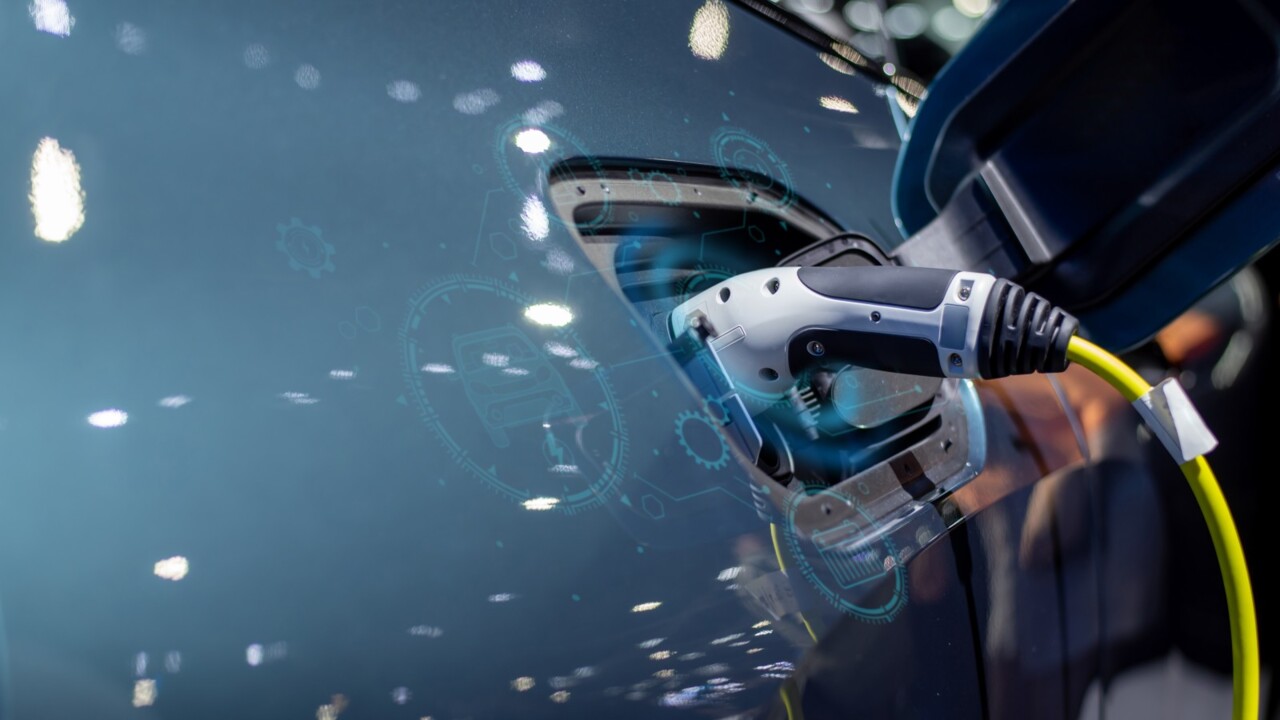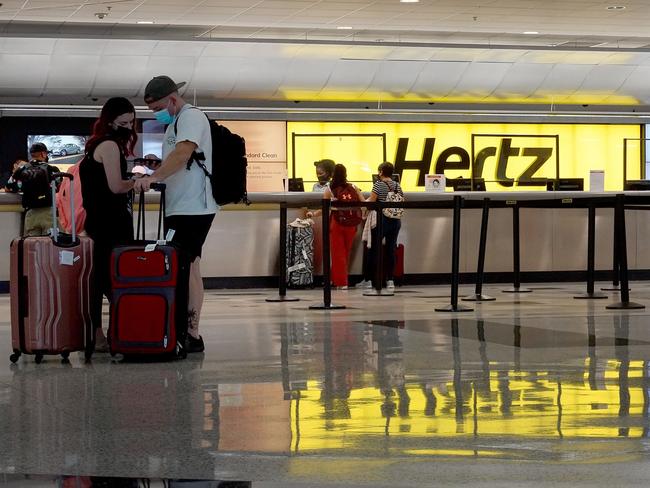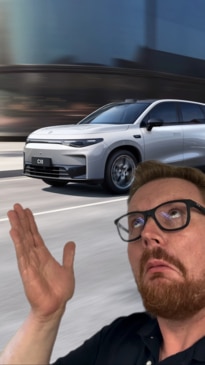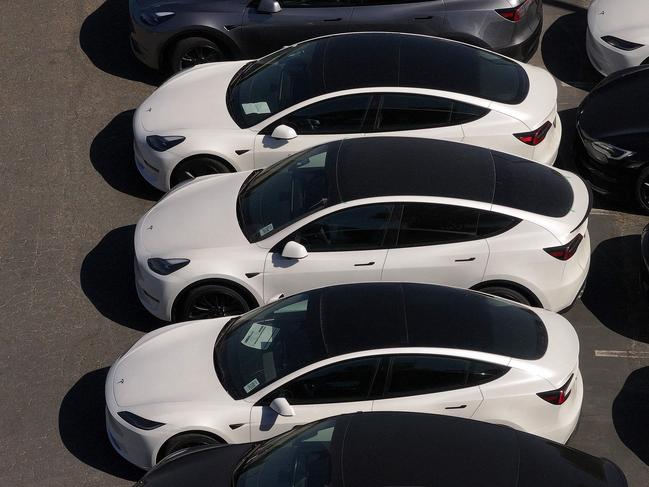Car rental giant Hertz posts $2 billion loss after EV strategy fails
Car rental giant Hertz has posted a $2 billion loss for the third quarter, which the company largely blamed on its failed electric vehicle strategy.

Motoring News
Don't miss out on the headlines from Motoring News. Followed categories will be added to My News.
Global car rental giant Hertz has posted a $US1.3 billion ($2 billion) loss for the third quarter of 2024, which the company blamed on its failed electric vehicle strategy.
Announcing its third-quarter earnings on Tuesday, the NASDAQ-listed company revealed a $US1 billion ($1.55 billion) non-cash asset impairment charge “largely due to the decline in fleet residual values over the last year or so”.
“The size of the impairment was largely driven by the gap between book values and the current market value of vehicles,” Hertz chief financial officer Scott Haralson said on an earnings call.
“I think that’s fairly obvious to most people.”
The bulk of the charge came from $US937 million ($1.4 billion) in vehicle depreciation, an 89 per cent jump from $US501 million ($777 million) a year ago.
But it was an improvement on the second quarter, when vehicle depreciation tripled year-on-year to $US1.04 billion ($1.6 billion).
Depreciation per unit (DPU) for the third quarter of 2024 was $US537 a month, and Hertz said it “expects to substantially complete the fleet rotation by the end of 2025, at which time it expects that DPU could normalise to under $US300”.

“We expect Q4 DPU to be in the $US350 to $US375 range,” Mr Haralson said.
“We previously hinted at a target run rate of $US325, but we have since contracted a significant portion of our model year 2025 purchases, and we now expect our run rate depreciation to be less than $US300 per unit per month, providing an even stronger platform for the transformation.”
In late 2021, Hertz announced plans to have 100,000 Teslas in its network by the end of 2022, amounting to 20 per cent of its entire fleet.

The global fall in EV demand, which has led companies like Tesla to slash prices, has resulted in the residual value of Hertz’s fleet falling far faster than anticipated.
In April, Tesla again cut prices on its best-selling models by $US2000 per vehicle, days after chief executive Elon Musk announced the carmaker was axing 10 per cent of its workforce globally, or about 14,000 jobs.
Hertz said in January it would offload one third of its US fleet of Tesla and Polestar EVs, or around 20,000 vehicles, citing high ongoing repair costs and poor resale value making it harder to refresh its fleet.
The following month it cancelled a planned purchase of 65,000 Polestars, and in April said it would sell off an additional 10,000 EVs.
Both brands are still available for rent in Australia where the company has no plans to remove them, Drive reports.
Former Hertz chief executive Stephen Scherr, who bet big on EVs after leading the company out of bankruptcy, resigned in March over the failed push.
Hertz had previously boasted its Tesla investment would give it “the largest rental fleet of EVs in the US”.

“EVs are less than 10 per cent of the fleet today, so we’ve sort of rotated through a vast majority of that move,” Mr Haralson said. “The remaining EVs are strategically placed in our fleet, so we’re happy with those levels.”
Mr Haralson said there would likely be “some excess depreciation to push through” the balance sheet in future quarters, “it will just be a much smaller number than before the impairment”.
“The increase in value of some of our non-fleet assets offset decreases in values and other assets,” he said.
“The result is that the impairment charge doesn’t completely correct the book value to market value dislocation of our fleet.”
Hertz chief executive Gil West told investors the company’s analysis suggested it could produce the same number of transaction days with a smaller fleet.
“Our most critical asset is currently our biggest constraint and has the most significant impact on our business,” he said.
“To address this, we have accelerated our fleet rotation.”
Hertz’s plan to flood the market with second-hand Teslas comes as prices for used EVs continue to plunge at a far faster rate than petrol cars.
A September study by iSeeCars found used EV values in the US were down 25 per cent over the past year, compared with 4 per cent for used petrol cars and 6 per cent for hybrids.
“But it’s lower than the 30 to 40 per cent drops we were seeing at the end of 2023 and first half of 2024,” iSeeCars executive analyst Karl Brauer said.
“And the substantial drop in EV prices over the past year appears to have brought them in line with demand, with used EV days-on-market much lower today, reflecting a faster selling rate compared to a year ago.”
Hertz’s net loss of $US1.3 billion ($2 billion) resulted in a negative 52 per cent margin, or $US4.34 loss per diluted share.
Its Q3 revenue fell 4.7 per cent to $US2.6 billion ($4 billion) and it had $US501 million ($777 million) in cash and cash equivalents on hand as of September 30.
The latest result marked the fourth straight quarter Hertz has posted higher-than-expected losses.
Hertz’s share price has plunged 60 per cent since the start of the year from $US10.39 per share to $US3.79 on Thursday, taking its market cap to $US1.26 billion ($1.95 billion).
EV sales have continued to grow in the US, increasing 7.8 per cent year-on-year as of the end of September, according to official figures.
But President-elect Donald Trump, a frequent critic of EVs, has vowed to ease emissions standards and other incentives, saying on the campaign trail he would “end the electric vehicle mandate on day one”.
How aggressively he pursues those promises remains to be seen, with Mr Trump’s close relationship with Mr Musk — one of his most important backers during the election — likely to complicate things.
Originally published as Car rental giant Hertz posts $2 billion loss after EV strategy fails





